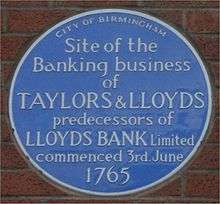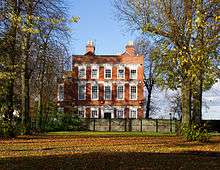Sampson Lloyd
Sampson Lloyd (15 May 1699 – 1779)[1] was an English iron manufacturer and banker, who co-founded Lloyds Bank.[2] He was part of the notable Lloyd family of Birmingham.
.jpg)
Career
Sampson Lloyd was the third son of Sampson Lloyd (1664–1724) and Mary (née Crowley, sister of Ambrose Crowley), Quakers of Welsh origin, who had moved from their Leominster, Herefordshire farm to Edgbaston Street in Birmingham in 1698.


After the death of his father in 1725, he and his older brother, Charles (1696–1741) bought the Town Mill and traded in iron. He also bought a forge in Burton upon Trent. After Charles' death in 1741, Lloyd became wealthy and in 1742 bought for £1,290 a 56-acre estate called "Owen's Farm" in the manor of Bordesley (in the area now known as Sparkbrook) on the edge of the town of Birmingham. He retained the Tudor farmhouse and built a Georgian mansion nearby which he called "Farm", now a grade II* listed building.
Lloyd continued to live partly in his former town-house in Edgbaston Street, Birmingham, near his ironworks. In 1765, at the age of 66, he formed a company with his son (also named Sampson) and the leading Birmingham button maker John Taylor (1704–1775), and his son, creating Birmingham's first bank: Taylor's and Lloyds,[2] located at 7 Dale End. This is the bank which became Lloyds Bank, now part of Lloyds Banking Group.
Family
Lloyd married twice. His first marriage in 1727 was to Sarah Parkes (1699–1729), daughter of Richard Parkes (died 1729). His son by this marriage, Sampson, was also a founder of another company, Taylor, Lloyd, Hanbury and Bowman in Lombard Street in London.[2][3]
Lloyd's second wife, whom he married in 1731, was Rachel Champion (1712–1766), daughter of Nehemiah Champion (1678–1747).[4] There were four sons and two daughters who survived to adulthood of this second marriage, including Charles Lloyd (1748–1828) the second son.[5] He was also a partner in the bank; his son, Charles Lloyd, the poet, was only briefly involved in banking.
References
- Montgomery-shire Collections. Powys-land Club. 1876. p. 342.
- Price, Jacob M. "Lloyd, Sampson". Oxford Dictionary of National Biography (online ed.). Oxford University Press. doi:10.1093/ref:odnb/37682. (Subscription or UK public library membership required.)
- Humphrey Lloyd (5 November 2013). Quaker Lloyds in the Industrial Revolution. Routledge. p. 106. ISBN 978-1-136-60575-8.
- Day, Joan. "Champion family". Oxford Dictionary of National Biography (online ed.). Oxford University Press. doi:10.1093/ref:odnb/49063. (Subscription or UK public library membership required.)
- John Burke (1838). A Genealogical and Heraldic History of the Commoners of Great Britain and Ireland, Enjoying Territorial Possessions or High Official Rank: But Uninvested with Heritable Honours. Henry Colburn. pp. 112–3.
Sources
- A History of Birmingham, Chris Upton, 1993, ISBN 0-85033-870-0
- The Lloyds of Lloyds Bank - An examination into Family History, Gilbert.